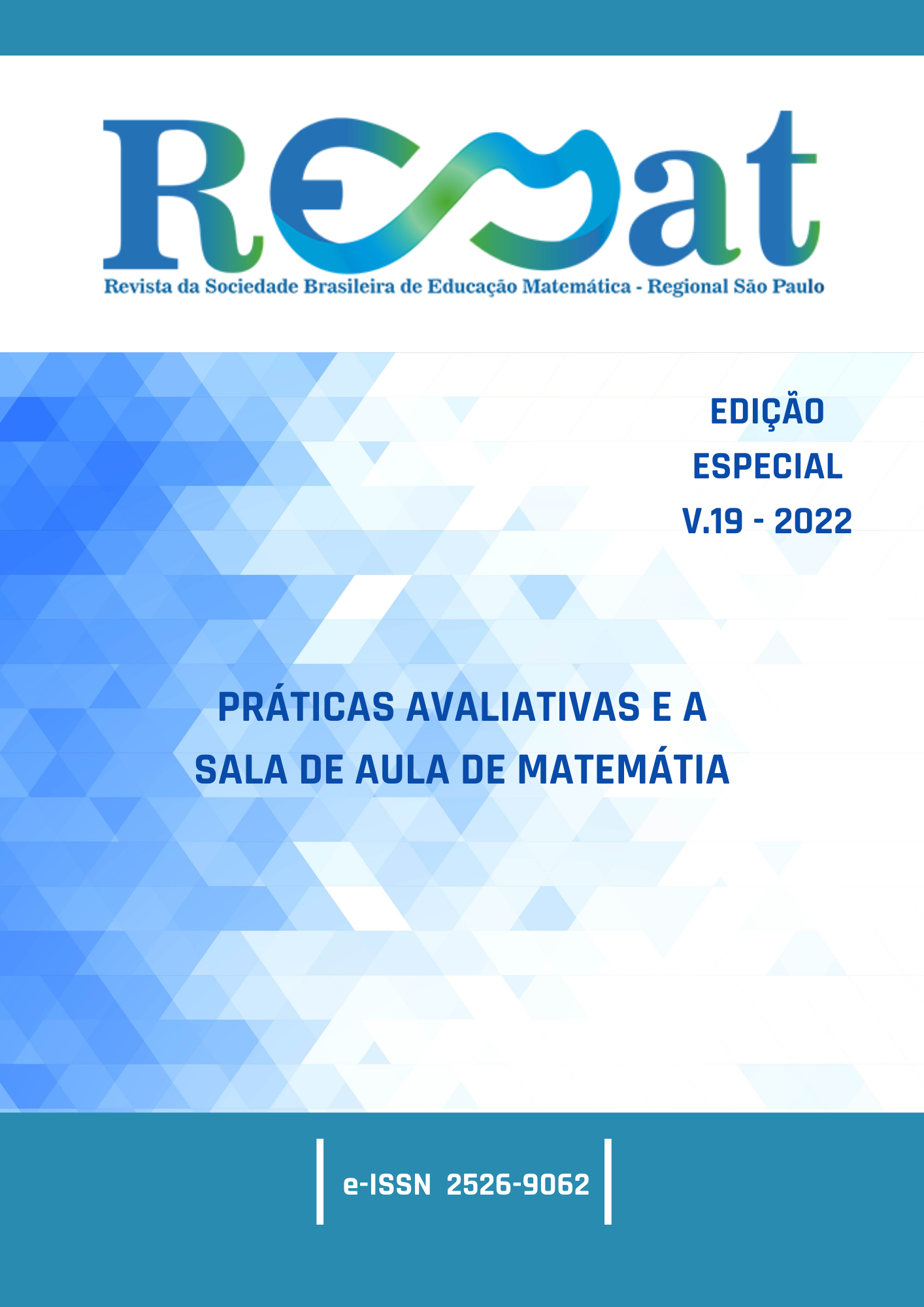An investigation into the perceptions of teachers who teach Mathematics in relation to evaluation practices during emergency remote teaching
DOI:
10.37001/remat25269062v19id668Keywords:
Evaluation, Mathematics, Emergency Remote TeachingAbstract
This article is part of a broader research that aimed to identify aspects of the teaching practices of teachers who taught mathematics during a certain period of the Covid-19 pandemic. In particular, this study investigates the evaluation practices of these teachers, as well as their perceptions about the positive and negative points of these practices and the possible changes they intend to implement when returning of classroom teaching. Thus, an online questionnaire was developed, which was answered by one hundred teachers. For the qualitative analysis of the data, Laurence Bardin's content analysis was adopted. Based on the teachers' answers, the main results were: the reproduction of evaluative strategies from face-to-face teaching to remote teaching; the absence of positive points in the evaluation during remote learning; the non-intention to maintain digital technologies for the evaluation in the return to the in-person classes. Finally, it was observed that remote teaching served for some as a means of reframing evaluation in Mathematics.
Downloads
Metrics
References
ALYRIO, R. D. Métodos e técnicas de pesquisa em administração. Rio de Janeiro: Fundação CECIERJ, 2009. Disponível em: <https://canal.cecierj.edu.br/recurso/6448>. Acesso em: 27 out. 2021.
BARDIN, L. Análise de Conteúdo. Trad. Luís Antero Reto, Augusto Pinheiro. São Paulo: Edições 70, 2016. 288p.
BRASIL. Presidência da República. Decreto nº 5.622, de 19 de dezembro de 2005. Brasília, 2005. Disponível em: <http://www.planalto.gov.br/ccivil_03/_Ato2004-2006/2005/Decreto/D5622.htm>. Acesso em: 27 out. 2021.
BRASIL. Ministério da Educação. Parecer CNE/CP nº 5/2020. Disponível em: <http://portal.mec.gov.br/index.php?option=com_docman&view=download&alias=14511-pcp005-20&category_slud=marco-2020-pdf&Itemid=30192>. Acesso em: 27 out. 2020.
CHRISTENSEN, C. M.; HORN, M. B.; STAKER, H. Ensino híbrido: uma inovação disruptiva? Uma introdução a teoria dos híbridos. Trad. Fundação Lemann e Instituto Península, 2013. Disponível em: <https://www.christenseninstitute.org/publications/ensino-hibrido>. Acesso em: 27 out. 2021.
FERREIRA, L. A.; CRUZ, B. D. S.; ALVES, A. O.; LIMA, I. P. Ensino de Matemática e COVID-19: práticas docentes durante o ensino remoto. Em Teia, Recife/PE, v. 11, n. 2, p. 1-15, 2020. Disponível em: <https://periodicos.ufpe.br/revistas/emteia/article/view/247850>. Acesso em: 27 out. 2021.
FRANÇA-CARVALHO, A. D.; ARAÚJO, Z. T. S.; SERAFIM, G. S.; SOUSA, J. S. A avaliação formativa no ensino remoto: algumas reflexões acerca da ação docente. Interação, Curitiba/PR, v. 21, n. 1, p. 38-46, jan./mar. 2021. Disponível em: <http://interacao.org/index.php/edicoes/article/view/87>. Acesso em: 27 out. 2021.
GARCIA, J.; GARCIA, N. F. Impactos da pandemia de COVID-19 nas práticas de avaliação da aprendizagem na graduação. EccoS, São Paulo/SP, n. 55, p. 1-14, out./dez. 2020. Disponível em: <https://periodicos.uninove.br/eccos/article/view/18870>. Acesso em: 27 out. 2021.
GONSALVES, E. P. Conversas sobre iniciação à pesquisa científica. 2 ed. Campinas: Alínea, 2001. 80 p.
HODGES, C.; MOORE, S.; LOCKEE, B.; TRUST, T.; BOND, A. The Difference Between Emergency Remote Teaching and Online Learning. Educause Review, mar. 2020. Disponível em: <https://er.educause.edu/articles/2020/3/the-difference-between-emergency-remote-teaching-and-online-learning>. Acesso em: 27 out. 2021.
LIMA, D. O.; NASSER, L. Avaliação no Ensino Remoto de Matemática: analisando categorias de respostas. RBEM, Juazeiro/BA, v. 01, p. 01-19, jan./dez., 2020. Disponível em: <https://www.revistas.uneb.br/index.php/baeducmatematica/article/view/10311>. Acesso em: 27 out. 2021.
LUCKESI, C. C. Avaliação em educação: questões epistemológicas e práticas. São Paulo: Cortez, 2018. 232 p.
MORAES, R. Análise de conteúdo. Revista Educação, Porto Alegre, v. 22, n. 37, p. 1-12, 1999.
MORGADO, L. O Papel do Professor em Contextos de Ensino Online: Problemas e virtualidades. In: Discursos, III Série, nº especial, p. 125-138, 2001. Disponível em: <https://repositorioaberto.uab.pt/bitstream/10400.2/1743/1/professor_online_linamorgado.pdf.>. Acesso em: 27 out. 2021.
NASSER, L.; LIMA, D. O.; VAZ, R. F. N.; SILVA, F. M. Práticas Insubordinadas na Avaliação Matemática. RIPEM, v. 9, n. 3, p. 114-128, set. 2019. Disponível em: < http://sbem.iuri0094.hospedagemdesites.ws/revista/index.php/ripem/article/view/2202>. Acesso em: 27 out. 2021.
PASCHOALINO, J. B. Q.; RAMALHO, M. L.; QUEIROZ, V. C. B. Trabalho docente: o desafio de reinventar a avaliação em tempos de pandemia. Labor, Fortaleza/CE, v. 1, n. 23, p. 113-130, jun. 2020. Disponível em: <http://www.periodicos.ufc.br/labor/article/view/44225>. Acesso em 27 out. 2021.
SANTANA, C. L. S.; SALES, K. M. B. Aula em casa: educação, tecnologias digitais e pandemia. Interfaces Científicas, v. 10, n. 1, p. 75-92, 2020. Disponível em: <https://periodicos.set.edu.br/educacao/article/view/9181>. Acesso em: 27 out. 2021.
SANTO, E. E.; TRINDADE, S. D. Educação a distância e educação remota emergencial: convergências e divergências. In: MACHADO, D. P. Educação em tempos de COVID-19: reflexões e narrativas de pais e professores. Curitiba: Editora Dialética e Realidade, p. 141-151, 2020.
SILVA, E. S.; CALDATO, J. C.; ALMEIDA, M. V.; BACCAR, M. H. M. M.; MOURA, M. K. G. Uma investigação sobre a percepção de professores com relação ao ensino remoto emergencial de matemática. RPEM, 2022. No prelo.
SKOVSMOSE, O. Cenários para investigação. Bolema, Rio Claro/SP, v. 13, n. 14, p. 1-24, 200.
TOMAZINHO, P. Ensino Remoto Emergencial: a oportunidade da escola criar, experimentar, inovar e se reinventar. 1. ed. Porto Alegre: SINEPE/RS, abr. 2020. Disponível em: <https://tomazinho.com.br/ensino-remoto-emergencial-a-oportunidade-da-escola-criar-experimentar-inovar-e-se-reinventar>. Acesso em: 27 out. 2021.
Downloads
Published
Métricas
Visualizações do artigo: 173 PDF (Português (Brasil)) downloads: 67
How to Cite
Issue
Section
License

This work is licensed under a Creative Commons Attribution-NonCommercial-NoDerivatives 4.0 International License.


 Português (Brasil)
Português (Brasil)
 Español (España)
Español (España)
 English
English






































